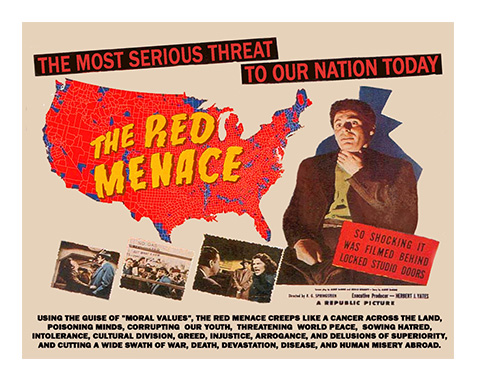
America’s fear of socialism has bred some pretty wild reactions, not the least of which was the McCarthy-inspired fear and sloganeering of the 1950s. “Better dead than red” strongly supported the idea that communism, seen as analogous to socialism by many at that time (and today as well), was a system so evil that death was preferable. The implication was “I’d rather die than live under commies.”
Entities like the John Birch Society, initially regarded as a fringe group of political wackos until Arizona Senator Barry Goldwater was nominated as the Republican candidate for President in 1964, built their following with conspiracy theories and paranoia, not unlike today’s Q-anon. Movies like The Manchurian Candidate reinforced America’s fears with tales of U.S. servicemen being brainwashed by brilliant-but-evil Chinese communist super villains. Even adding fluoride to drinking water to reduce childhood cavities was characterized as a communist plot to poison Americans, a theme director Stanley Kubrick chose to feature in his brilliant film satire Dr. Strangelove, or How I Learned to Stop Worrying and Love the Bomb. In that film, an insane General intent on starting a nuclear war is convinced that commies are attempting to degrade his “precious bodily fluids.”
For those of us who went to grammar school and hid under our desks in “duck and cover” exercises intended to protect us from “the bomb,” the idea of being “better dead than red” had some resonance. For most of us, it felt unreal; there was no way a flimsy desk was going to protect us from the atomic bomb. For others, it fueled an episode of fear that stimulated the business of building bomb shelters, a vision that evolved into the ‘survivalist” movement that continues today and has ironically repurposed 50s-era ballistic missile silos as bulwarks against nuclear apocalypse.
Communism, envisaged by Karl Marx as a classless society, never really has existed. Despite its lofty rhetoric, the Soviet Union was just another brief experiment in totalitarian government, as is so-called Communist China. Democratic government is still a work in progress, as our most recent Presidential election amply displays. Socialism, on the other hand, has been incorporated at some level into every system of government, which is to say it represents an effort to offer beneficial services to entire communities, such as fire departments, sewer districts, hospitals and road maintenance. Using public resources broadly on behalf of the greater good rather than narrowly for the benefit of a particular caste or group of individuals creates a more stable and safe society for everyone. At least that’s the theory; in practice, social benefits have been unevenly applied.
The current pandemic, combined with the ascendancy of Trump and Q-anon-like conspiracy theories, has pumped new life into the “better dead than red” philosophy. The perfectly sensible and admittedly unpleasant need to wear a face mask or get vaccinated generates outrage by resisters about what they view as government’s infringement of freedom of choice. This same group may well find themselves promoting a self-destructive philosophy. The scientific truth about a lethal respiratory disease spread by exhaled breath transcends political sloganeering; the deaths of 300,000 Americans and counting tragically makes the point. Avid Trumpsters like to emphasize that the Corona-19 virus originated in Red China. Whether dead is better has yet to be proven by them.